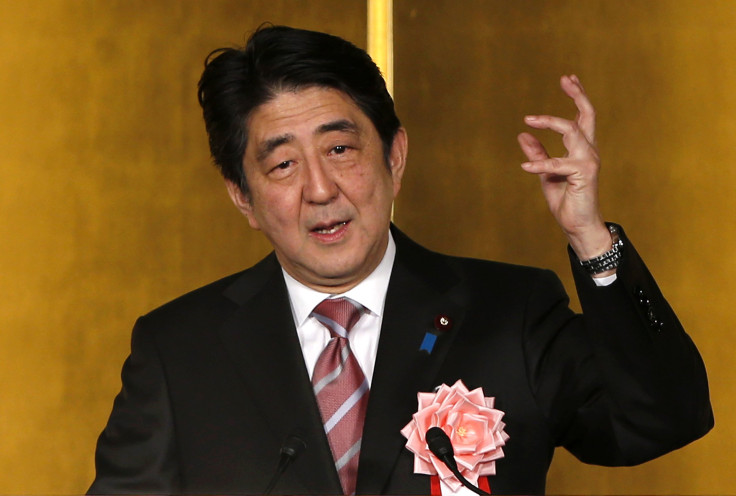Japan Military Power: Abe Angles For Greater Presence For First Time Since WWII

Japan wants to play a bigger role in the world's military conflicts for the first time since World War II, but its leaders' plan to revise national laws that mandate pacifism is fraught with obstacles. The policy shift could see Japan adopt a stronger military presence in the region at a time of increasingly tense territorial disputes with its heavily militarized neighbors.
Japan has long been bound by its pacifist constitution to use its military for only self-defense. But under the proposed law, tentatively called “The Situation Threatening Japan’s Existence,” Japan would be able to defend itself and its allies, as well as participate in international military aid, without needing to draft up temporary laws before doing so each time. The bill is expected to be introduced to the bicameral legislature, known as the Diet, later this month and will likely be debated in March or April after Japan's 2015 budget has been approved, reported Asahi Shimbun. This would be the first formal attempt to define Japan's military presence's role through legislation since national leaders agreed last summer to lift a decades-old ban on any military activity beyond acts of self-defense.
Prime Minister Shinzo Abe is expected to face significant hurdles in passing the bill. “He’s going to have to fight this battle within his government as well before it can go into the Diet,” said Shihoko Goto, senior associate of the Asia Program at the Wilson Center. She said Abe will need to convince the Komeito, the more moderate and pacifist partner to his ruling Liberal Democratic Party coalition, to approve the drafting of the bill.
The Komeito will likely water down the proposed law, according to Richard Bush, director of the Center for East Asia Policy Studies at the Brookings Institute. “The area that comes to mind is whether the commander in the situation that arguably calls for a collective self-defense action to support the U.S. military, which is what collective self-defense is all about, can act on his own initiative or needs some sort of prior permission,” said Bush. “Operational reality would argue for giving the commander on-the-spot authority to act on his own; political reality might call for getting permission.”
Japan's current pacifist constitution means its armed forces are prohibited from participating in any matters that do not directly affect the country, which Abe proposed to change last summer. “It began as a big debate as to whether the Japanese should revise its constitution,” said Goto. “But it was eventually watered down to a reinterpretation of the constitution allowing for the right to collective self-defense.” But even a watered-down version of the bill would likely be significant, said Goto. “It cannot be any weaker than it is today,” she said.
Abe’s effort to revise Japan's self-defense laws comes as the country is engaged in disputes over what it calls the Senkaku Islands, as well as the rapid militarization of its regional neighbors. “There is currently a lot of tension in East Asia, with threats from North Korea and the rapid militarization by China,” said Goto. “There has been a shift in the defense landscape in Asia in the last three years.”
Abe wants to increase Japan's defense budget by 3.5 percent – it has traditionally spent less than 1 percent of its GDP on its military. While Japan’s neighbors might see the passing of the bill as an act of aggression, mainland China, Taiwan, Vietnam and the Philippines have also invested in upgrading their military presence in the South China Sea in recent years.
“We shall never repeat the horror of war. With this reflection in mind, Japan has gone on for 70 years after the war. It will never happen that Japan again becomes a country which goes to war,” Abe said earlier this year.
After World War II, Japan chose to give up its sovereign right to war as a method of solving international disputes and instituted that policy into its constitution as Article 9 in 1947. The clause forbids Japan from holding a standing army. The Japan Self-Defense Force (JSDF) was created in 1954 as an extension of the police force to avoid a constitutional violation. Japan's laws do allow for the use of military force to defend itself and its allies under the caveat that the JSDF may be mobilized to assist only the United States if asked for help in “areas surrounding Japan.”
Abe will eventually have to convince the public that broadening Japan’s military powers is the right path to take. While voters won't get to weigh in on the legislation, Japan is expected to hold its upper house elections in July 2016, and lower house elections by December 2018.
Goto said more outward-looking voters see a need for the country to remain relevant internationally by participating in global defense, but many traditional voters are against any nonpacifist actions. A September 2014 poll conducted by the Yomiuri Shimbun, Japan's major newspaper, found 51 percent of those polled did not support collective self-defense, and Goto said that it is likely there will be a similar sentiment for Abe’s bill.
“Japan has not had any war casualty since 1945,” Goto said. “Japan is very proud of this fact and a lot of people want to keep this record.”
© Copyright IBTimes 2024. All rights reserved.





















